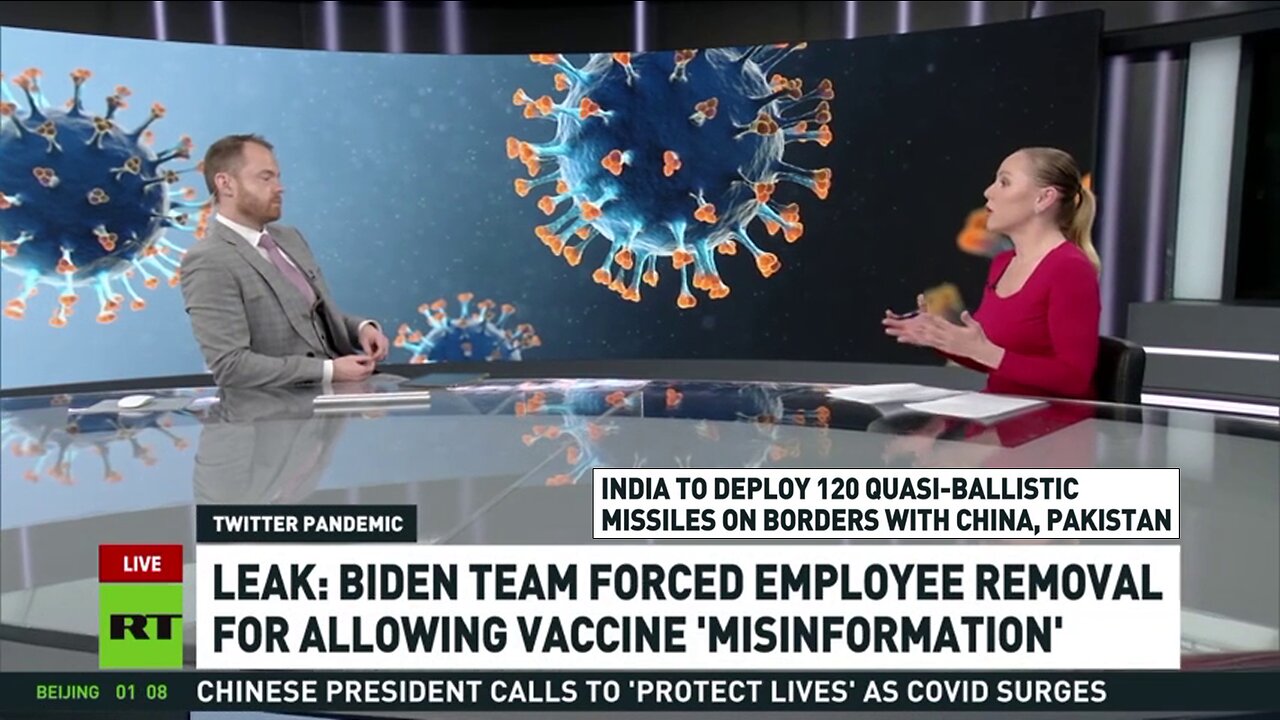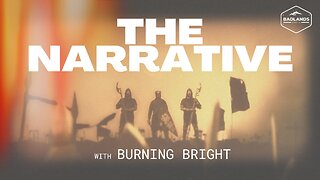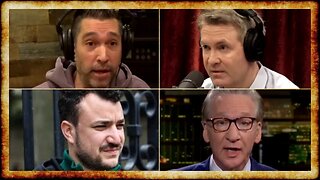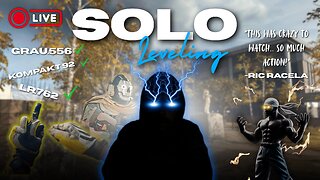Premium Only Content

RT News - December 26th 2022 Late
Three Russian servicemen die in a Ukrainian drone attack on an airbase in the central Russian region of Saratov.
Several Ukrainian saboteurs are killed by Russia's security service while attempting to cross into the country. The group carried Western-supplied weapons, as well as improvised explosives.
India's army is set to deploy around 120 quasi-ballistic missiles, which are able to change their direction in mid-flight.
Twitter "pandemic": David Zweig found that tweets had been deleted and accounts suspended, not because they were untrue but because they didn't fit the "western (Whitehouse) narrative" (QS so many qualified doctors and scientists have been vilified by the western press, literally ruining careers - I think "old twitter" should be made to pay - what do you think?)
Pres. Zelensky puts out a "Christmas" message.
Turkiye says French support of Kurdistan workers party led to the clashes in Paris. Recall a gunman shot and killed three people and injured more.
Mikhail Podolyak (advisor to Pres. Zelensky) continues to bash, without evidence, Iran for supplying drones to Russia (QS have to admit that his telegram said "blatantly humiliates sanctions...." I've been watching these accusations without evidence for months but that phrase about sanctions humiliation should be on everyone's twitter 😎) In depth report.
Russia is prepared to help the EU out of it's gas shortage.
=======================================================
Below 1) --- Serbia to greatly expand its Special Forces
2) ---- Ukraine dismantles monument to iconic Soviet author
3) --- French reveal their priorities in Ukraine crisis – poll
4) --- Putin speaks about ‘threats’ to ex-Soviet states
5) --- Ex-Russian president outlines timeline for reconciliation with the West
6) --- FEATURE Lenin's Yugoslavia: How a plan to create a 'Soviet Switzerland' was shot down by Stalin and other locals
=======================================================
via RT website 26 Dec, 2022 15:33
1) --- Serbia to greatly expand its Special Forces
New units expected to be formed by the end of 2023 would be ready to meet any challenges, Defense Minister has said
Serbian President Aleksandar Vucic has ordered to raise the number of troops within the nation’s Special Forces from 1,500 to 5,000, Defense Minister Milos Vucevic said on Monday. The force is expected to be formed by the end of 2023, he added.
Serbia’s Army would get “5,000 highly trained and well-prepared soldiers, non-commissioned officers and officers, who will have completed most modern, up-to-date training… and will have state-of-the-art weapons and military equipment,” Vucevic said in an Instagram post.
The new force would be “the strongest fist that would smash to pieces the malicious intents and goals of those who do not like our nation and want to harm our people,” the minister said, adding that the reformed Special Forces would be ready to fulfill any tasks in any part of the country at any time, and to “respond to all challenges our homeland is facing.”
The announcement comes amid a tense standoff between Serbia and Kosovo that has already drawn the attention of the EU and NATO. Tensions flared up earlier this month when Serbs, who make up the majority in the northern part of the breakaway region, put up barricades to protest against the arrest of a former police officer accused of attacking a Kosovo law-enforcement patrol.
Serbia has asked the NATO-led KFOR peacekeeping force for permission to deploy up to 1,000 Serbian troops and police officers in Kosovo. Belgrade has a right to do so under UN Security Council Resolution 1244, which put an end to the NATO bombing of the former Yugoslavia in 1999. The US said it “categorically” opposes the return of Serbian forces to Kosovo.
Earlier on Monday, the US, the UK, France, Germany and Italy reportedly demanded that Belgrade ensure that Kosovo Serbs remove the barricades within 24 hours.
NATO took control of Kosovo in 1999, after bombing Serbia on behalf of ethnic Albanian separatists. The province’s provisional government declared independence in 2008, which Belgrade has refused to recognize.
https://www.rt.com/news/568953-serbia-expand-special-forces/
=================================================
26 Dec, 2022 14:48
2) ---- Ukraine dismantles monument to iconic Soviet author
A statue of Maxim Gorky in the city of Dnepr has been removed amid the “de-Russification” campaign
Ukrainian authorities have taken down a monument to Maxim Gorky, a revolutionary who founded socialist realism and became one of the most popular Soviet writers, in the eastern city of Dnepr. The move comes amid the “de-Russification” campaign ongoing across the country.
A crane lifted the statue from its pedestal and loaded it into a dump truck on Monday. City officials slated eight monuments “linked to the history and culture of Russia and the USSR” for removal earlier this month. The Gorky statue in Dnepr was vandalized in 2017 and 2021.
Mayor Boris Filatov said all monuments that are removed will be temporarily stored on the premises of the city’s animal control service. The Gorky statue is the work of the Dnepr-born sculptor Nikolay Krasotin and was unveiled in 1977.
Gorky is considered the founder of Soviet literature. He pioneered the socialist realism genre, the writing style and aesthetics of which were designed to serve the purpose of building a socialist state.
The writer was arrested for participating in the 1905 Russian revolution, but was quickly released, partly thanks to protests from abroad. He then left to live abroad to avoid another arrest, but chose to return after the 1917 Bolshevik revolution, becoming one of the most renown writers of the Soviet Union.
He is best known for many plays, such as ‘The Lower Depths’ and ‘Summerfolk’, as well as an autobiography titled ‘My Childhood’.
Gorky died in 1936 while working on the novel ‘The Life of Klim Samgin’, which is set in late Imperial Russia and during the revolution. Gorky was friends with Vladimir Lenin, and has sometimes been described as Joseph Stalin’s favorite writer.
In 2015, Ukraine adopted a law designed to “de-Communize” the country, which called for the removal of street names and monuments tied to the Soviet era. While officials argued that the process would help Kiev break from its Communist past, the campaign also targeted landmarks with wider links to Russia.
After Moscow launched its military operation in the neighboring state in late February, officials across Ukraine began increasingly taking down monuments associated with the time when the country was part of the Russian Empire. They dismantled not only statues and busts of monarchs and generals, but also monuments to writers and scientists, including poet and author Alexander Pushkin, who lived in the early 19th century.
In June, the Ukrainian Culture Ministry created a council tasked with coordinating “the issues of de-Russification, de-Communization and decolonization.” Culture Minister Aleksandr Tkachenko called this month for the “boycotting of Russian culture” across the globe, urging opera houses to stop playing music written by Pyotr Tchaikovsky and other Russian composers.
Moscow has repeatedly criticized the Ukrainian authorities for what it considers “forced Ukrainization and de-Russification” aimed at suppressing the rights of about a quarter of the country’s population.
https://www.rt.com/russia/568947-ukraine-gorky-monument-removed/
====================================================
26 Dec, 2022 13:48
3) --- French reveal their priorities in Ukraine crisis – poll
Seven out of ten people would prefer to see peace talks rather than betting on a battlefield victory for Kiev, the survey found
French people overwhelmingly favor arming Ukraine while promoting a negotiated peace solution, as opposed to simply giving Kiev weapons until it can defeat Russia, an opinion poll released on Sunday has shown.
Seven out of ten people in France told the pollster Ifop that they wanted their government and the EU as a whole to pursue peace talks while keeping up military aid to Ukraine. Details of the December survey were published by Le Journal du Dimanche.
Only two options were offered for this particular question. The 'talks plus arms' outcome was favored by the majority across the political spectrum, from 57% among supporters of the Socialist Party to 88% among those who voted for conservative political commentator and presidential candidate Eric Zemmour, the report said. Support for peace talks was at 60% among those who backed President Emmanuel Macron’s Renaissance Party.
Divided into social groups, women (73%), people aged 25 to 34 (75%), public sector employees (73%) and residents of rural areas of France (72%) were the most likely to prefer a diplomatic solution to unconditional military support for Kiev.
The French perceive the future of the conflict with Russia with great uncertainty, the poll indicated. Just 21% said they expected the Ukrainian crisis to be over before 2024, while almost half (46%) declined to predict a deadline.
The share of the population worried about the conflict has dropped from 92% in early March to 83% this month, Ifop found.
Macron has stirred anger in Kiev and among Ukraine’s most vocal supporters in the EU by repeatedly calling for a negotiated end to the conflict. He stated that Russia will need to receive long-term security guarantees from the US and its allies as part of any solution.
Russia has cited NATO’s creeping expansion into Ukraine as one of the key reasons for deploying troops against its neighbor. Moscow perceives the US-led military bloc as an existential threat. An Ifop poll conducted in March said almost a third (30%) of French people agreed with the Russian argument.
https://www.rt.com/news/568945-france-peace-poll-ukraine/
=============================================
26 Dec, 2022 15:00
4) --- Putin speaks about ‘threats’ to ex-Soviet states
CIS members are ready to cooperate despite rising challenges from outside the community, the Russian president has said
Post-Soviet republics face an increasing number of external threats to their security, Russian President Vladimir Putin has stated.
Speaking at a traditional informal summit of the leaders of the Commonwealth of Independent States (CIS) in St. Petersburg on Monday, Putin stressed that while regional actors sometimes have different opinions, they are ready to cooperate to resolve any disputes.
The Russian president noted that the “friendly circle” is a testament to CIS members’ readiness to cooperate “in the spirit of true strategic partnership, mutual benefit and respect for the interests of all countries.”
Putin highlighted the role the CIS is playing in supporting regional security and stability. “Unfortunately, challenges and threats in this area, coming primarily from outside, are growing every year,” he said. Against this backdrop, he added that CIS intelligence agencies and other security institutions have been engaged in “close contacts.”
Putin did admit that CIS members sometimes find themselves at loggerheads. “The main thing, however, is that we are ready and willing to cooperate. Even if any problematic issues arise, we strive to solve them on our own, together, while providing each other with comradely assistance and mediation,” he added.
According to the Russian leader, deepening cooperation between CIS members is “in line with the fundamental interests of the peoples of our countries,” as it helps in tackling social and economic problems while contributing to regional security.
Putin also pointed out that CIS members are tightly knit in cultural and historic terms, with the Russian language being “a powerful unifying force, bringing together our multinational states.”
The president’s remarks come after he accused the West of “devising scenarios for inciting new conflicts” in the post-Soviet space in a bid to pursue the “policy of dictate in all areas.” He cited the Ukraine conflict as an example of such efforts at a September meeting with the heads of CIS security agencies.
Formed after the dissolution of the Soviet Union and incorporating some of its former republics, the CIS promotes cooperation in economic, political, and military affairs. Apart from Putin, the summit was attended by the leaders of Azerbaijan, Armenia, Belarus, Kazakhstan, Kyrgyzstan, Tajikistan, Turkmenistan, and Uzbekistan.
https://www.rt.com/russia/568942-putin-eurasia-cis-external-threats/
===================================================
26 Dec, 2022 09:22
5) --- Ex-Russian president outlines timeline for reconciliation with the West
Trust has been broken for at least a generation by the US and its allies, who have cheated Russia, Dmitry Medvedev insisted
Former Russian president Dmitry Medvedev has accused Western powers of lying, causing a rift that will remain for decades to come, and convincing Moscow that there is no sense in trying to reach an agreement with them.
Medevedev, who serves as deputy chair of the national Security Council, wrote in a keynote article on Sunday that the year 2022 has shattered illusions about the West, proving that its promises and principles cannot taken at face value.
“Alas, there is nobody in the West we could deal with about anything for any reason,” he wrote.
Medvedev went on to say that nations that claim global leadership deceived Russia when they claimed NATO expansion in Europe posed no threat to it. They again lied when they backed a peace roadmap for Ukraine, which in reality was meant to give Kiev time to prepare for an eventual armed conflict with Russia, he added. The conflict in Ukraine is a war against Russia by a proxy, which was long in the making, Medvedev claimed.
The behavior of Washington and others this year “is the last warning to all nations: there can be no business with the Anglo-Saxon world [because] it is a thief, a swindler, a card-sharp that could do anything.”
For Russia, there will be no restoration of normal relations with the West for years or even decades to come, Medvedev predicted.
“From now on we will do without them until a new generation of sensible politicians comes to power there. We will be careful and alert. We will develop relations with the rest of the world,” he wrote.
However, Medvedev argued that the loss of Western leadership could be a net positive, considering what he called the moral bankruptcy of the US-led neo-colonial order. Elites that caused the financial meltdown of 2008 and the ongoing global crisis are unable to claim global leadership, he wrote.
“The West is incapable of offering to the world any new ideas, which would take humanity forward, solve global problems, or provide collective security,” the former president insisted.
Medvedev expects that several regional blocs will emerge in the near future, each with its own values and rules, and that Russia will have its place in the new order.
https://www.rt.com/russia/568924-medvedev-rift-western-nations/
===================================================
FEATURE 26 Dec, 2022 12:00
6) --- Lenin's Yugoslavia: How a plan to create a 'Soviet Switzerland' was shot down by Stalin and other locals
Why the Transcaucasian SFSR created 100 years ago was not a viable state, and how Moscow influenced it
Exactly 100 years ago, the Transcaucasian Socialist Federal Republic (TSFSR) was formed, and became one of the four founding republics of the USSR. On December 13, 1922, Georgia, Armenia and Azerbaijan attempted to create a single state. It could have been considered a forerunner of later similar projects, further west, such as Yugoslavia.
This ended with a long war in the Balkans, but Transcaucasia – after the collapse of the TSFSR –continued to live in peace for many years to come. How did it happen and what role did Moscow play?
On the Periphery of an Empire
After the revolution and during the Civil War, Transcaucasia was on the periphery of the central authorities’ attention. Life there continued as usual, while the fate of all the lands of the Russian Empire was decided in St. Petersburg. The Provisional Government, which convened after the abdication of Nicholas II in February of 1917, announced the convocation of a new representative body – the Constituent Assembly – while voicing the intention to grant nations the right to self-determination. A Special Transcaucasian Committee consisting of five State Duma deputies was created to manage the territories of the Tsarist Caucasian viceroyalty.
The committee was headed by Vasily Kharlamov, representative of the liberal Party of Cadets. It also included representatives of the Socialist Revolutionaries, the most popular party in the empire, as well as the Armenian Revolutionary Federation, the Azeri Musavat Party, and the Georgian Socialist-Federalist Revolutionary Party. The latter was later replaced by a member of the Menshevik Socialist Party, which was popular in Tbilisi.
This composition corresponded to the balance of power in the region and was convenient for managing and maintaining the status quo during preparations for the Constituent Assembly, but not for the upcoming power struggle. The fact is that in Transcaucasia, as well as throughout Russia, dual power was established very quickly. The Provisional Government formed by the State Duma enjoyed the right of succession of power and exercised its powers from the center, but grassroots councils of deputies consisting of workers, peasants and soldiers operated locally (the First World War was still ongoing).
In Transcaucasia, there were actually only two large cities, two capitals. The administrative and cultural center was Tiflis (as Tbilisi was called until 1936) in Georgia, which had been a center of tsarist power for 150 years. The economic and industrial center was Baku in Azerbaijan, where oil had been produced since the 1870s. And while the power of the Provisional Government prevailed in Tiflis, the local Soviet of Workers' and Soldiers' Deputies headed by the charismatic Bolshevik Stepan Shaumyan was more important in working-class Baku. In October of 1917, the Bolsheviks carried out a military coup in Petrograd and announced the dissolution of the Provisional Government. Then, in place of the Special Committee, a Transcaucasian Commissariat was formed in Tiflis, where the Georgian Social Revolutionaries and Mensheviks, who were hostile to Lenin and the Bolsheviks, maintained control. At the same time, Soviet power was established in Baku, and Shaumyan was appointed extraordinary commissar of the Council of People’s Commissars (central government of the Bolsheviks) for the Caucasus.
From Imperial Backwater to National Republic in No Time
While political strife was intensifying in the northern Caucasus Mountains and Red and White blocs were gradually forming in the Civil War, inter-ethnic conflicts rapidly escalated in Transcaucasia. With the de-facto disappearance of the central government in the region, the numerous bones of contention between the Armenians, Azerbaijanis, and Georgians increasingly led to clashes resulting in casualties. Most often, armed clashes took place in disputed territories between the Armenians and Azerbaijanis, especially in Elizavetpol (Ganja) and Erivan (Yerevan).
The Ottoman Empire, which in recent years had suffered military defeats at the hands of the Russian army, added fuel to the fire. The Turks tried to reverse their fortunes by stirring unrest among the Muslim population of Azerbaijan and were quite successful in this. One of the leaders of the Georgian Mensheviks, Akaki Chkheneli, noted that “the armed Muslim population, adhering to the Turkish orientation, call themselves Turkish soldiers and terrorize the entire Christian population of Transcaucasia with its anarchic manifestations.”
After the Bolsheviks, who seized power in Petrograd, made peace with Turkey in December of 1917, the national question became less acute, and Transcaucasian politicians had the opportunity to decide how life would be organized in their lands. After the Bolsheviks had dispersed the Constituent Assembly, its deputies elected in the Transcaucasia formed a Transcaucasian Seim. Three national parties were represented in approximately the same proportion, with a slight formal preponderance of Georgians. It seemed that the situation in the region was stabilizing, but this feeling was deceptive.
Just two months after peace had been concluded with Turkey, when the Russian troops had nearly left the Caucasian Front, and the Armenian Corps, which had not yet been fully formed, took their place, the Turks violated the truce and launched a large-scale offensive.
As a result, the main task of the Transcaucasian Seim, which had not even had time to meet yet, was the conclusion of a peace treaty with Turkey. The question was at what price this peace would be achieved.
The disagreements between the three nations were particularly pronounced here. The Armenians advocated the preservation of Transcaucasia as part of Russia, since only it could guarantee the eastern Armenians safety from the massacre that befell their Western relatives. In addition, the Armenians hoped to preserve the territorial acquisitions of the Russian Empire in Western Armenia, which belonged to Turkey. The Azerbaijanis believed that Transcaucasia should decide its own fate independently of Russia, making peace with Turkey on the basis of refusing to interfere in its internal affairs. Moreover, the idea of joining Turkey was very popular among Azerbaijanis. The Georgian side basically supported Baku on the issue of declaring the independence of Transcaucasia and concluding an independent agreement with Turkey, since Transcaucasia simply did not have the strength to confront Turkey militarily. At the same time, the Georgians expected that Germany or another European power would become the guarantor of independence.
None of the three sides was willing to compromise, and while they argued among themselves, Turkey made more and more ambitious demands on Transcaucasia as it easily advanced along the front. It quickly became clear that it would be easier for each of the peoples to achieve their goals separately – the Transcaucasian Federation lasted a little more than a month and was dissolved in May 1918.
In 1918-1920, the newly formed Transcaucasian republics that took its place fought with each other. The conflict between Armenia and Azerbaijan over Nagorno-Karabakh was particularly bloody. The stability of the fledgling states was first guaranteed by the intervention of Germany and Turkey, and later, after they surrendered in the World War, by Britain, which was interested in Baku's oil. Britain intended to help the White troops in the south of Russia, and also supported national movements in the North Caucasus, including through the provision of weapons. In parallel, the Transcaucasian republics fought for recognition in the international arena and sought to enter the League of Nations.
However, all these efforts were nullified after the Red Army completed its defeat of the Whites in the North Caucasus in April of 1920 and entered Azerbaijan, the old base of the Baku Council. Subsequently, having agreed with the Turkish government of Kemal Ataturk, it went on to occupy Armenia and Georgia. Thus, the Bolsheviks’ power was established in all three of Transcaucasia’s national republics by the end of the year.
Where Revolution Ends
The year 1921 was pivotal in the Civil War. Uprisings broke out in the Tambov Region, Western Siberia, and Kronstadt, which were brutally suppressed by the Red Army. Famine raged in the Volga Region and in Ukraine. The first signs of an impending split appeared within the Bolshevik Party, and The New Economic Policy was announced. At the same time, there were discussions about the administrative structure of the new state and the solution of the national question.
From the onset of the Revolution, the Bolsheviks had vowed to destroy the Russian Empire as a “prison of peoples” and give all nationalities the right to self-determination. In the first stages, this actually saved them, since without the strength and organization of Latvian riflemen, their uprising would undoubtedly have been suppressed. But by the later stages of the war, during the march on Warsaw, this promise had, in fact, already been broken. Now the task was to maintain control over the territory of the former empire, while demonstrating how progressive the Marxist system was by satisfying requests for national sovereignty. There were two approaches to solving this problem.
The proponent of the first was Stalin. The party considered him to be the main specialist in ethnic affairs due to his Georgian origin and a rather superficial work he wrote in 1913, entitled Marxism and the National Question. In this pamphlet, he pointed to a common language, territory, economy, and character as obligatory traits for defining a nation. On this basis, for example, ignoring 2,000 years of history, he claimed that the Jews were not an independent people, and their assimilation was an imminent and inevitable process.
In 1921, Stalin looked at the possibility of joining all the Socialist Republics to Russia while granting them broad autonomy. At the same time, distinctions were made between supposedly established, full-fledged nations and nationalities that could skip the national stage of historical development and move directly from a feudal system to a communist one without the formation of an intermediate national bourgeois state. This approach would further divide the former empire into Socialist Republics within the USSR, with the formation of autonomous regions within them. Thus, Stalin was already thinking in terms of the borders of the former Empire, leaning, in fact, to the idea of ‘peaceful coexistence’ of two systems – communist and capitalist – which he later realized.
Lenin and Trotsky thought quite differently. They believed to a much greater extent in the idea of a world revolution and were also guided by the economic theory of communism. According to it, agrarian Russia was insufficiently developed and did not have sufficient means of production (industry, science, communications) to build communism. A young country simply could not survive alone, opposing the entire bourgeois world, which was much more developed. They believed in the need for a permanent revolution that would be exported from Russia, with subsequent unification of the economies of communist countries. Given the revolutions taking place in Germany and northern Persia, as well as the popularity of leftist ideas there, all this seemed quite realistic.
Employing this supranational logic, Lenin proposed unifying the Transcaucasian republics into a single state on territorial principles. In addition, the presence of such a multinational federation among the founding countries of the USSR, which probably reminded the Bolsheviks of Switzerland, would emphasize the international status of the Soviet Union and hint at the possibility that other communist countries could voluntarily accede to it. And, since Lenin’s authority in the party was absolute, this was the position that prevailed.
However, this was probably his last clean victory. The federal treaty between socialist Armenia, Georgia and Azerbaijan was signed on March 12, 1922, but Lenin was to suffer his first stroke in May. The struggle for power that began afterwards was won by Stalin, and the federal character of the Soviet Union was already nominal in its 1936 constitution, which the national republics signed individually.
The disagreement on the issue of the federation of Transcaucasia clearly reveals a fundamental difference between the two heads of the USSR. For Lenin, the idea of building global communism was the primary goal, and Russia was only the means. Stalin was convinced that the most important thing was to retain power domestically, and ideas about a worldwide revolution could lead to its loss, and therefore was considered dangerous.
A Failed Union
How could the idea of uniting three ethnically, linguistically, religiously, and culturally different peoples in one country have appeared at all? If you look from Tbilisi, Yerevan, and Baku, the idea seems preposterous. But they were being observed from Petrograd and Moscow. The fact is that if we look at the Russian Empire as a colonial power and compare it with Spain, England, or France, then Transcaucasia resembles a colony.
When Catherine the Great signed the Treaty of St. George on the annexation of Kartli-Kakheti by the Empire in 1784, there was no normal land connection with Transcaucasia. The Caucasian ridge between Russia and Georgia was as difficult a natural barrier to overcome as the Atlantic Ocean between Spain and Mexico. In addition to the high mountains and snow-swept passes in winter, there was also a serious threat of attack from the local highlanders, which was only quashed by a long and bloody series of wars that lasted for a good half of the 19th century.
The ethnically diverse population of Transcaucasia did not have full-fledged statehood at that time, and local customs took the place of the law. In terms of colonial trade and natural resources, these lands may not have been as interesting as the colonies of Western European countries. Nonetheless, they could serve as a springboard for further expansion into the rich neighboring territories of the Ottoman Empire and Persia, which were beginning to weaken.
Accordingly, just as Spain paid little attention to the interests of the indigenous peoples of Mexico and Peru, Russia was primarily interested in convenience when it came to managing its ‘overseas’ territories. And since there were few real Russian colonists (most were military), the local population was content with the situation. Armenians, Azerbaijanis, and Georgians got along peacefully in Tbilisi and Baku. But as soon as the central government weakened, ethnic and religious conflicts began to flare up again, just as happened in India after the British left, for example.
The USSR’s social experiment with Transcaucasia was unique in that, thanks to the international ideology of communism, new colonies could develop on a par with the metropolises, and its citizens had the same rights, opportunities, and access to economic resources. After the Second World War, the Soviet Republics saw a rise in living standards and the construction of large infrastructure facilities. At the same time, interethnic conflicts seemed to have died out (although, as the collapse of the USSR showed, they were simply frozen), which made it possible for several generations to grow up with a sense of security.
Stalin, Sergo Ordzhonikidze, Anastas Mikoyan, and Lavrenty Beria were all born in peripheral colonies, but they ruled a huge metropolis by the 1930s. Little attention was paid to nationality in the USSR, and the privileges of hereditary elites did not exist. By comparison, the first non-Anglo-Saxon American president wouldn’t be elected until 1961 (the Irish Catholic John F. Kennedy), and the first baptized Catholic prime minister of the UK until 2019 (Boris Johnson).
And if we imagine that Lenin’s idea of a federal structure for Transcaucasia had not been buried by Stalin and that the post-Soviet leaders of such a federation would have had the political will to preserve unity, then who knows? Maybe today, instead of the constant threat of a war in Karabakh, there really would have been a Caucasian Switzerland – a serious regional power and an island of stability at the intersection of East and West. Or, of course, it could have imploded like Yugoslavia
By Anatoliy Brusnikin, Russian historian and journalist
https://www.rt.com/russia/568832-hundred-years-of-transcaucasian-sfsr/
======================================================
-
 DVR
DVR
Badlands Media
21 hours agoThe Narrative Ep. 18: Leaders of the Golden Age
48.6K7 -
 28:03
28:03
Adam Carolla
6 hours ago $0.23 earnedFraud, Corruption & Minecraft Mayhem - Gen Z's new Cult Classic | The Adam Carolla Show | #news
11.7K17 -
 2:37:08
2:37:08
TheSaltyCracker
4 hours agoTrump is The People's Champ ReeEEeE Stream 04-13-25
92.3K155 -
 4:24:35
4:24:35
Due Dissidence
13 hours agoDave Smith and Douglas Murray THROW DOWN, Judge OK's Khalil Removal, Maher Dishes on Trump Summit
22.4K26 -
 2:33:02
2:33:02
Nerdrotic
8 hours ago $1.63 earnedMysteries of Mars with Mike Bara | Forbidden Frontier 098
58.8K20 -
 3:05:07
3:05:07
IsaiahLCarter
3 hours agoApostate Radio #009: Standing Up with Eric Abbenante
16.3K1 -
 11:53
11:53
Forrest Galante
2 hours agoIs This Giant Extinct Sea Cow Still Alive?
12.3K4 -
 1:14:47
1:14:47
Josh Pate's College Football Show
5 hours ago $2.55 earnedTennessee & Nico Disaster | Portal Chaos Ahead | Biggest “What-Ifs” | Truth About Big Noon Kickoff
27.6K3 -
 2:14:43
2:14:43
Tundra Tactical
5 hours ago $0.33 earned$3200 ZEV HEARTBREAKER Contest!!! TONIGHT On The Worlds Okayest Gun Live Stream
25.8K -
 LIVE
LIVE
IcyFPS
3 hours ago🟢SOLO LEVELING LIVE 🟢 PREMIUM PAYDAY | SUNDAY GUNDAY |
203 watching